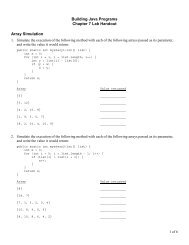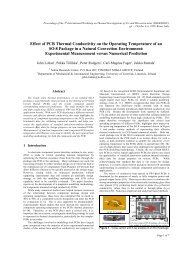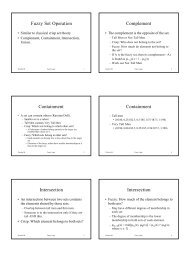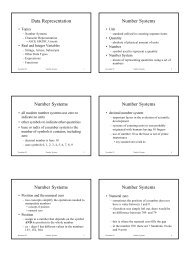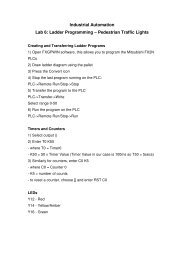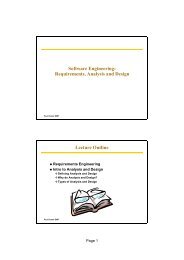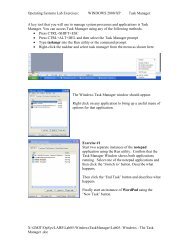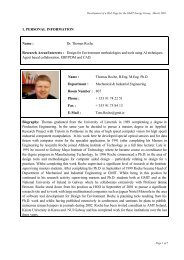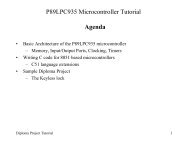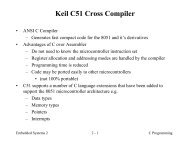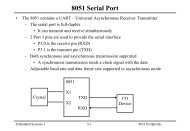You also want an ePaper? Increase the reach of your titles
YUMPU automatically turns print PDFs into web optimized ePapers that Google loves.
<strong>Real</strong>-<strong>Time</strong> <strong>Scheduling</strong>• If, always schedule ready task with EDFand let run to completion– straightforward, but using this, B will be missedas A already started.• Performance will improve if deadlines canbe known in advance of ready time.– Known as Earliest Deadline with unforced idletimes:-April 05 <strong>Real</strong> <strong>Time</strong> <strong>Scheduling</strong> 31<strong>Real</strong>-<strong>Time</strong> <strong>Scheduling</strong>• ED Unforced Idle <strong>Time</strong>– Always schedule eligible task with ED andallow it run to completion.• The eligible task may not be ready. The processorwill remain idle even though there are other readyprocesses. The processor may remain idle.– The result is that even though maximumutilisation is not achieved, all schedulingrequirements are met.April 05 <strong>Real</strong> <strong>Time</strong> <strong>Scheduling</strong> 32<strong>Real</strong>-<strong>Time</strong> <strong>Scheduling</strong>• Rate Monotonic <strong>Scheduling</strong> (RMS)– A way to resolve the multitask schedulingconflicts for periodic tasks.– Assigns priorities on the basis of a tasks period(shorter the period, higher the priority)– Priority is determined at design time andremains fixed. It is a static/fixed schedulingpolicy.April 05 <strong>Real</strong> <strong>Time</strong> <strong>Scheduling</strong> 33<strong>Real</strong>-<strong>Time</strong> <strong>Scheduling</strong>• Can compute schedulability using a singleutilisation bound for the entire set of tasks.– Will the system meet all hard deadlies?C1 C2C3Cnn+ + + ... ≤ n(2− 1)T T T T1 2 3– C = Execution <strong>Time</strong>– T = Period of a task– Sum of UtilisationsApril 05 <strong>Real</strong> <strong>Time</strong> <strong>Scheduling</strong> 34n1<strong>Real</strong>-<strong>Time</strong> <strong>Scheduling</strong>• RMS assumes that the end of a tasks period is ahard deadline and that all tasks are preemptible atany time.• If the condition is not met, a more detailedanalysis must be performed.• The upper bound converges to 69% as napproaches infinity.– Not unusual for a utilisation of 90% to be set forschedulability guarantee.April 05 <strong>Real</strong> <strong>Time</strong> <strong>Scheduling</strong> 35<strong>Real</strong>-<strong>Time</strong> <strong>Scheduling</strong>• With known utilisations, requirements candetermine if all tasks can be scheduledsuccessfully.• Even though it is possible to schedule moreperiodic tasks with EDF, RMS has beenadopted because:-– Performance difference is small in practiceApril 05 <strong>Real</strong> <strong>Time</strong> <strong>Scheduling</strong> 36



